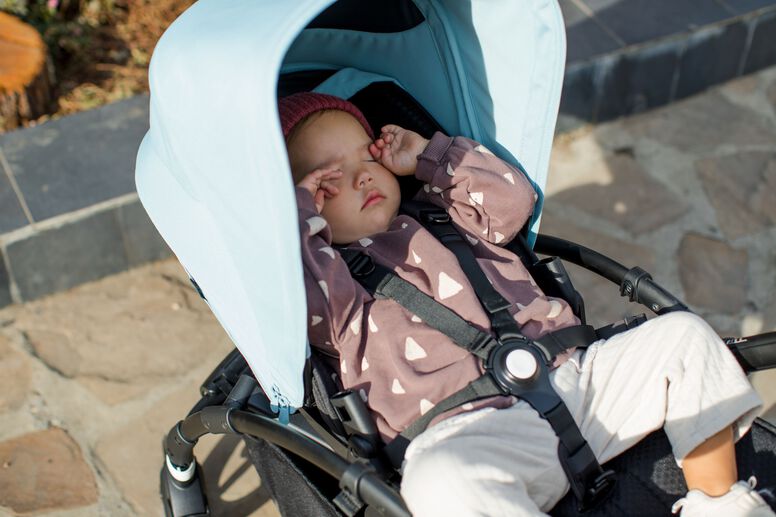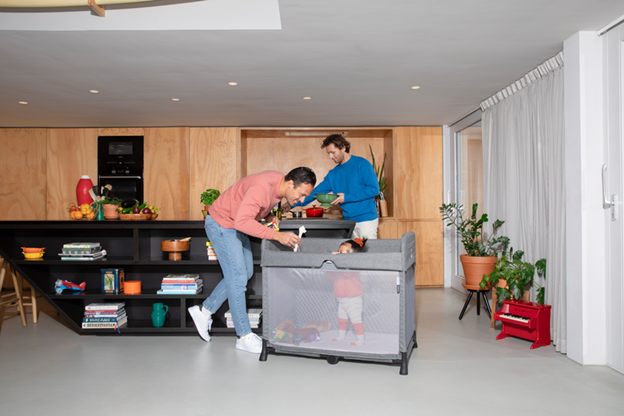Baby sleeping tips for the first 12 months
There are amazing organizations such as the Pediatric Sleep Council, Basis, and Safe to Sleep to help both parents and babies get a better night's sleep. Every baby is different, and you are also different depending on whether it's your first, second or sixth child. Ultimately, it takes time and patience, but as a sleep-deprived parent, you might feel overwhelmed and like you're doing it all wrong, especially if you're a first-time parent. Fear not; there are solutions and support backed by science and good old-fashioned experience from other parents.

Inside this guide, we cover:
- How much sleep do babies from 0-12 months need
- Reasons why your baby might not be able to sleep
- How to support your baby and their shifting sleep patterns
- How to help your sleep deprivation
A wise woman once said, 'no one knows sleep deprivation like a new mom.' We asked around at Bugaboo, and both moms and dads agreed. Some had chosen to block out those memories of their sleepless nights altogether, while others had beautiful stories of triumph and breakthroughs. Regardless of experience, there was a consistent theme about the need to understand your baby’s sleep phases throughout the first year to help those sleep-deprived moments make more sense.
How much sleep do babies need in the first year?
It's a considerable achievement and cause for celebration when your baby sleeps through the night. It's a question that every new parent gets asked, and if you pay attention, you can see the physical shift on their faces when it becomes a reality. Like any human, babies need sleep to promote growth, help their brain development, and even reinforce their immune system. Sleep is vital because poor sleep can influence and impact social skills, cognitive development, and more. You'll likely recall how a sleepless night can have a dreadful effect on you the next day before kids. Imagine your tiny human suffering through the same thing, only multiple times worse! The telltale signs of needing sleep are generally very loud in the form of a cry, rubbing of the eyes, and yawning. Spot them early so your child doesn’t become overtired.

The Sleep Foundation offers incredible insight into sleep via medically reviewed articles and support. What's important to know and understand is that sleep patterns change over time. In the first year alone, the number of hours of sleep required and the durations throughout the day and night dramatically change.
From 0-3 months old: Newborn babies need around 14-17 hours of sleep, but not in one hit. There's no 'sleep schedule' yet; babies will accumulate up to 12 hours of sleep at night and the rest during nap times. They have regular intervals for feeding, diaper changes, and much-needed cuddles with mom.
From 3-6 months old: babies start to shake things up as the amount of sleep drops to 12-15 hours. Naps become less broken, meaning longer stints of sleeping like a baby. It’s usually around this time when parents can inform friends and family that their tiny human has begun to sleep through the night, and perhaps they have their first overnight adventure in their comfy travel cot. A massive welcome for the parents. Hurrah! Time to party, but not too loud - remember the saying, 'never wake a sleeping baby.’
From 6-12 months old: babies are shifting their sleeping habits again, and the majority of their shut-eye is at night and may reach 10-12 hours. Yet, this is when growth spurts occur, teething commences, and sleep regression can rear its ugly head. This time can be challenging for parents—just as everything begins to fall into a routine, it all goes topsy turvy again. It's usually around this period that sleep-training strategies can be employed if necessary.
We've looked at how much sleep babies need during their first year of life. Now, let's dive into why your baby might not be sleeping and ways to support them.
Why is my baby unable to sleep, and how can I support them?
No matter the age of your baby, investing in good baby products to support your baby is going to help them sleep better in various circumstances such as in the car, sleeping over at friends’ houses and out and about exploring all the world has to offer! However, there are some common problems that interrupt sleep, regardless of their current ‘nest’.

Babies from 0-3 months of age
Night time disruptions are a part of parenthood. Fact. But if there are ongoing problems, it can make it hard for your tiny human and you to get the rest required to solve the issues. For example, if your baby has been rocked to sleep and held a lot for the first few months of its life, and this changes, it can be a crude awakening - literally. Babies get used to being put to sleep in your arms, and they resist sleep when it comes to changing this and transitioning.
Resisting back-sleeping
Problem: it can look like restless, unsettled fussing when your tiny human is laid down to sleep because they feel more secure when sleeping on their stomachs, which isn't ideal due to potential health risks. Therefore, experts recommend laying babies on their backs, keeping the issue persisting.
Solution: Try swaddling your baby so it feels safe, secure, and cocooned. If you're open to it, a pacifier can be well received by your baby, meaning bonus sleep is up for grabs. It's another 'give it time' game, and let's hope swiftly, your baby will get used to sleeping on its back.
Confusion about whether it’s day or night
Problem: we've all experienced that mix-up of day and night when we’ve traveled long haul, right? Sometimes your baby can end up sleeping all day and awake all night. Not ideal for anyone involved.
Solution: limit daytime naps to three hours so your baby realizes the distinction between the two, which can be a little jarring after nine months in the womb, sleeping and partying on their own terms. Also, avoid artificial light, and the TV during night feeds will serve you well!
Not being full-up enough
Problem: most 2-3 month-old babies need their tummies filled up once or twice at night, which can be even more prevalent for breastfed babies. If they're not full up, they could wake up more often.
Solution: it could be an idea to track how many feeds your baby has at night and talk to your medical practitioner about it before reducing overnight feeds because you want to ensure your child has enough during the day.
Ultimately, we encourage all parents, whether for the first time or not, to seek medical support and advice if their intuition and experience suggest more significant issues at play. Never feel like you can seek help or guidance - you are 100% allowed to ask.
Babies from 3-6 months of age
Between 3-6 months old, babies begin to sleep through the night and sleep for more extended periods, but this is also the time when sleep regression can start. It is perfectly normal and can happen a few more times before your baby's first birthday.
Sleep regression
Problem: at four months old, your child is beginning to become more aware and engaged with the world around them. You'll likely start to notice sleeping patterns tipping a little off balance - like not going to sleep or waking up a lot more often.
Solution: this is a prime time to set up a solid routine for your child - a warm bath, comforting feed, lullabies, dimmed light, and cuddles to set them up for bedtime. Give space for your child to adjust to this new phase of development, and sleep patterns should follow close behind. Bear in mind that a baby without sleep during the day will likely be overtired and find it harder to settle and sleep at night.
Shifts in nap routines
Problem: as babies grow older, their nap routine changes. Some babies adjust swiftly, and it doesn't impact their nighttime sleep and nap routine. However, some tiny humans nap less often and can get cranky and have trouble sleeping at night.
Solution: a great way to ease them into naptime is, you guessed it, a routine beforehand. Perhaps you can play some soft and gentle music, read a story, or do a delicate baby massage to set them up for what's coming. Sleep!
Change up their bedtime routine
Problem: when your child reaches six months old, sleep patterns have likely changed and balanced out, with your baby sleeping approximately 10 hours at night with a couple of naps a day, and by nine months, even longer! However, there can be interruptions, such as not being able to fall asleep independently. This is typically when some parents opt for sleep training/teaching, but it's not necessary; it's a personal choice that you get to make.
Solution: a little shake-up to the bedtime routine can work wonders. For example, the last feed before bed can happen approximately 30 minutes before bedtime or a nap which will help your child get sleepy - this is prime time to place them in their cot. It's around this age when they learn to soothe themselves, perhaps there’s some crying and unhappiness, but we encourage you to stick with it. You could bring in a pacifier if you use one, but your baby will settle and drift off to sleep peacefully with a bit of perseverance.
Allow your baby to cry
Problem: this is somewhat of a controversial topic, and there are debates about whether it is good or not to let babies cry themselves to sleep. Recent research by the University of Warwick suggests it does not adversely affect their behavior development or attachment.
Solution: while leaving your tiny human to cry can be challenging and pull very firmly at your heartstrings, especially when they are smaller, it can work because, by six months old, babies are aware that crying tends to result in being picked up, fed, or rocked. Still, once they realize that mom and dad aren't buying that one, they nine times out of ten stop crying and choose to rest after approximately four nights. This is, of course, personal preference.
Babies from 6-12 months of age
Help them sleep longer
Problem: now your baby sleeps through the night around 6-months old, and you're doing life with ease and grace, the chances are you'd love a little sleep-in to boot!
Solution: you can employ a few tactics to ensure they're not up at the crack of dawn, like adjusting nap schedules and experimenting with different bedtimes. You can also improve their bedroom setting by making it more light and soundproof so as not to disturb them, so they sleep longer.
Teething
Problem: when the telltale signs of drooling, irritability, chomping, and fussing at feeding time start, this means teething has begun, and it could also interfere with sleep.
Solution: as we focus on rest and ensuring routine and harmony lead, try to avoid picking your child up. Instead, soothe them with a teething ring, a solution to apply on their gums, or a gentle stroke of their head as you settle them back to sleep.
Unforeseen disruptions
Problem: Sleep disruptions can happen due to a change of environment or routine, an illness such as a chesty cough, growth spurts, or the room's temperature. Perhaps you’ve been on your first family vacation, and they’ve gotten used to sleeping in their travel cot, and now you’re back home, and it’s all new again.
Solution: Try to get back into your usual rhythm so your baby can resume its regular routine. It might take a few days, so go easy on yourself and your co-pilot during these times.
Signs of overtiredness
Problem: many parents have learned that overtired children don't like sleep even though it's the one thing that will do them good. When you spot signs of sleepiness, that's your cue - rubbing of eyes, yawning, nodding off while eating their last bites.
Solution: as much as possible, avoid putting your baby down to sleep when they've tipped over the edge - so you don't also. It's also essential to keep a mental log of how much sleep your baby has and needs. If they wake up earlier than expected from their last naptime, it might be an idea to put them to bed a little earlier to avoid overtiredness. Vice versa, if the night is restless, increase the nap time.
Those early days and months of newborn life can be tricky; trust your intuition and that your baby is more than likely on the right track regarding the amount of sleep they need.
How to cope with sleep deprivation as a new parent
Your entire world has changed. Now you have this tiny human who brings you nothing but joy and love and sleepless nights. Sleep deprivation can be very challenging for parents, especially when adults are recommended to sleep between seven to nine hours a night. “Navigating your and your newborn’s sleep are among the steepest challenges during the early weeks of an infant’s life.” says Dr. Rebecca Robbins. Sometimes it's not even your baby keeping you up; you might be struggling to get to sleep in the first place or anxiously waiting for a cry to commence.
The first six weeks or so after your baby is born can be the most challenging, but a study published in 2019 found that parents can experience sleep deprivation for the first six years of their children's lives, which doesn't mean it's to the same extent during this period of time. But not all hope is lost. Here we've put together some tips to help you achieve a little bit more shut-eye.

Sleep when your baby sleeps
You’ll need to shift from what you would 'usually' do before your baby arrives, and while it can be tempting to get stuff done while they sleep, this is prime time to catch up on your sleep—so take advantage when you can.
Their routine impacts yours
There isn't much of a routine in place in the first few months of your baby's life, but you can still influence their environment by keeping the room nice and dark and soothing them when they cry and fuss. Once those days are a distant memory, creating and maintaining a calming bedtime routine will encourage a healthier sleep for all involved.
Share the same room
The American Academy of Pediatrics (AAP) advises babies to sleep in the same room as their parents for the first year of life because it can decrease the risk of SIDS by as much as 50% and is much safer than bed-sharing. It can also help you get more sleep; if you don't have to keep moving from room to room in the middle of the night, you and your baby will get back to sleep more easily.
Seize the opportunity to sleep
The seven-nine hours of recommended sleep for adults don't need to happen all in one go. Take the chance to get short 20-minute power naps whenever you can. Discuss with your partner or friends so they can support you and your forty winks.
Create a personalized sleep plan
You will have made a birth plan, so why not make a plan to support sleep deprivation once your baby arrives? You can also see this as an opportunity to discuss how your partner, family, and friends can help your transition into parenthood. If you have a partner available to support you throughout the day and night, talk about how it can work before your baby is born. Sit down with your partner and decide how night feeds will work and if they can get the baby for breastfeeding. You can also determine if you'd like additional support, such as a doula.
Minimize screen time at night
Exposure to blue light from backlit electronic devices can wreak havoc on your circadian system and guarantees you will struggle to fall asleep. Our advice? Power down at least 30 minutes before bedtime.
Create a pool of sleep-supporting tools
Sometimes, sleep deprivation makes it harder to fall asleep even when there's an opportunity to get some shut-eye. When that happens, take advantage of tools such as meditation, breathing exercises, or journaling before it's time for lights out.
Most importantly, don't be afraid to ask for help, and ultimately, don’t be too hard on yourself during this hugely transitional time. The dishes and the laundry can wait as long as you and your family are healthy. Before you know it, you'll be packing the bags for your child's first sleepover with grandma and grandpa so you can have your first uninterrupted night's sleep and some much-needed one-to-one time with your partner. When you’re ready for playtimes again, feel free to pop open the Bugaboo Stardust play yard and spend some quality time with the whole family.

Futher information and resource
The Lullaby Trust has lots of useful information and support for parents about safe sleep.
American SIDS Institute is dedicated to the prevention of sudden infant death and the promotion of infant health.
The Baby Sleep Site has a range of baby sleep consultants and experts.
BASIS (Baby Sleep Info Source): Normal sleep development
Mindell J, Kuhn B, Lewin DS, Meltzer LJ, Sadeh A. (2006) Behavioral treatment of bedtime problems and night wakings in infants and young children.
Staples AD, Bates JE, Petersen IT. (2015) Bedtime routines in early childhood: prevalence, consistency, and associations with nighttime sleep.
Sleep expert Jodi A. Mindell, Ph.D. CBSM has lots of great resources and successful books on the subject of children and sleep.